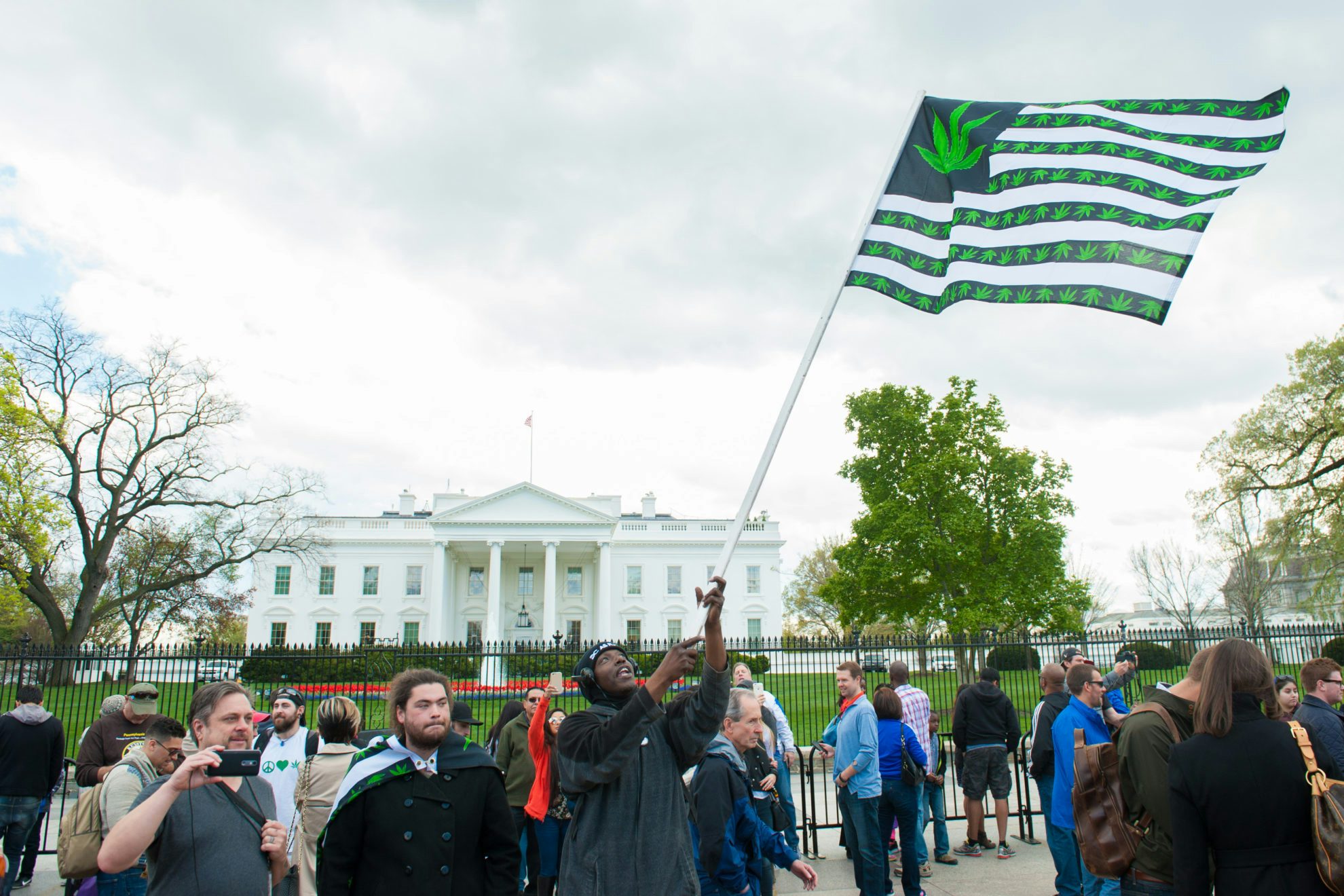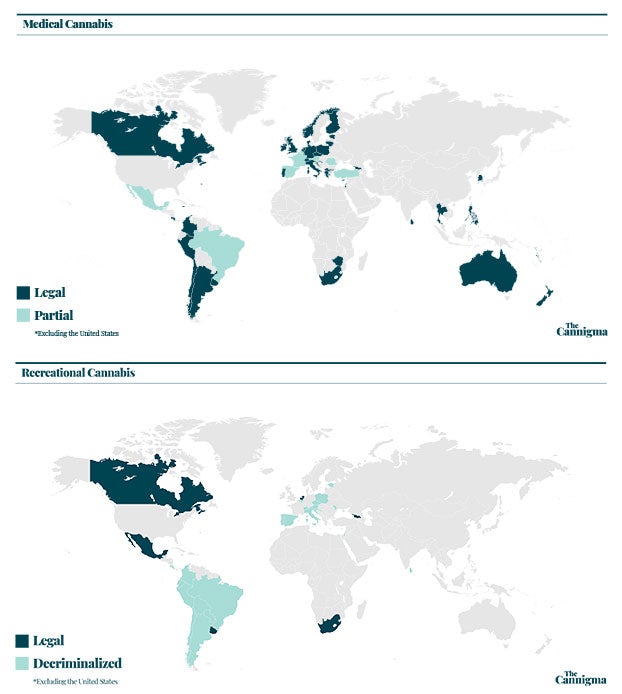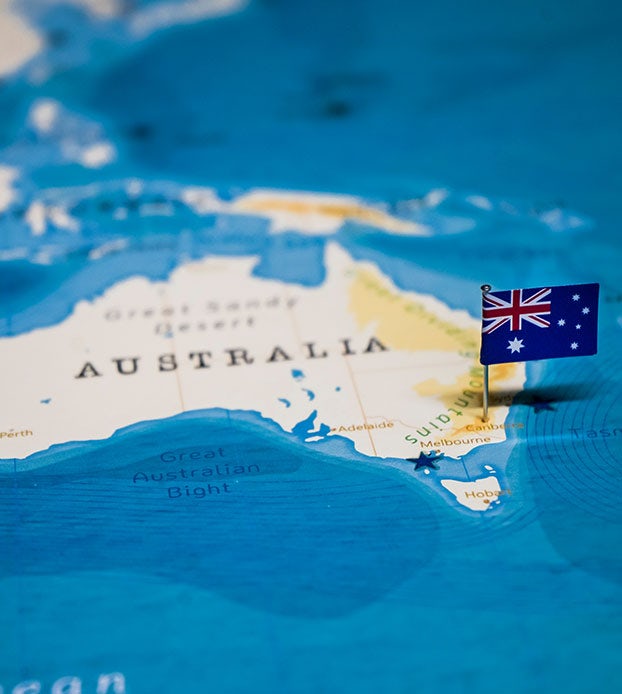Medical: Legal
Recreational: Illegal (though at least one territory has adopted decriminalization)
Australia has a legal medical marijuana program, and while recreational cannabis remains illegal on the federal level, the enforcement of cannabis laws and the penalties handed out can differ widely from one territory to another.
Furthermore, regardless of the legal status of the plant in Australia, it is by far the most popular illicit drug, and past year use in Australia (10.6 percent) remains far higher than the world average (3.9 percent), according to the United Nations World Drug Report for 2020.In addition, a survey published in July 2020 found that 41% of Australians support cannabis legalization, and 37% are opposed. This represents nearly double the level of support found in a 2007 survey (21%).
The country legalized medical cannabis in 2016, but patients in the country have long criticized the program as too restrictive, and access to cannabis-based medicines remains behind that of many other legal cannabis jurisdictions.
A major move in the direction of legalization took place in September 2019, when the Australian Capital Territory legalized cannabis possession (up to 50 grams) and the cultivation of up to two cannabis plants. And while voters in nearby New Zealand voted down a legalization initiative in late 2020, the cause of cannabis reform in the region is clearly gaining prominence.
How to get medical marijuana in Australia
Australia’s medical cannabis program is run by the country’s Therapeutic Goods Administration (TGA), though patients can only gain access through a registered healthcare practitioner.
According to the Commonwealth Department of Health, Nabiximols (a cannabinoid spray marketed as Sativex) is the only cannabis product that is considered a registered medicine in the country. No cannabis products are subsidized through the Pharmaceutical Benefits Scheme (PBS), and the price is set by the supplier. This also means that the TGA has not accessed these medicines for their safety, quality, or effectiveness.
Patients who want access to these medicines can import them from Canada or Europe, including cannabis flower for vaping, oils, liquids, and oral sprays. Medicinal cannabis products must be purchased at pharmacies, though they’re often out of stock and must be ordered.
Under Australian law, doctors can apply to the TGA’s “special access scheme,” to gain access to unapproved medicine like cannabis. Physicians who have also received certification as authorized prescribers do not need this approval to gain access. It is unclear to what extent this special certification is necessary or how it expedites the process, and at least one estimate states that as much as 98% of cannabis prescriptions are made by regular physicians who are not pre-authorized to recommend cannabis.

A doctor who applies to the TGA on behalf of a patient must provide a clinical justification. According to the TGA, the justification must include:
- An outline of the patient’s symptoms and/or diagnosis
- Details of relevant past treatments and procedures trialled or considered, including reasons why therapeutic goods currently included in the ARTG may not be the most appropriate treatment for the individual patient in the particular circumstance
- An appraisal of the expected clinical benefits versus the potential risks of the proposed treatment.
In addition, as of early 2021, it is legal to purchase CBD oil over the counter in Australia.
Qualifying conditions for medical marijuana
Under TGA regulations, there are currently “no restrictions on the medical conditions for which a prescriber may apply via the SAS to access an unapproved medicinal cannabis product for their patient, provided the prescriber has the appropriate knowledge on the condition being treated and on the medicinal cannabis product they wish to prescribe.”
That said, the TGA does note that it may request supporting evidence for some novel indications.
Some of the health conditions for which medical cannabis can be prescribed in Australia include:
- Multiple Sclerosis
- Chemotherapy-induced nausea and vomiting
- Cancer pain
- Palliative care
- AIDS
- Tourette’s Syndrome
- PTSD
- IBS
- Crohn’s Disease
- Refractory epilepsy
- Neuropathic pain
- Certain psychiatric conditions
- Rheumatological conditions
- Glaucoma
- Autism Spectrum Disorder
- Parkinson’s Disease
What Australian law permits for medical patients
There is currently only one cannabis product that is a registered medicine in Australia – Nabiximols (marketed as Sativex).
There is nonetheless a wide range of unapproved medicinal cannabis products – including oil, tinctures, extracts, and flower – which are not included on the Australian Register of Therapeutic Goods (ARTG). Doctors must receive the patient’s informed consent before they can apply to the TGA to access an unapproved product.
But unapproved or unregistered is not the same as illegal.
Australian law allows the import of unapproved medicines for the use of the individual or their immediate family under the personal importation scheme. The law allows the import of a 3-month supply, with some restrictions.
The Office of Drug Control has published a list of manufacturers and suppliers of medicinal cannabis products that can be accessed in Australia. These products can only be accessed through the Special Access Scheme by an authorized healthcare practitioner, or as part of a clinical trial, according to the Office of Drug Control.
Costs of medical marijuana
The high cost of medical marijuana is one of the main obstacles to access in Australia.
Estimates vary – and depend largely on the type and amount of cannabis product – but ABC News in February, 2020 reported that medical cannabis can easily cost patients $600 per month. The Australian cannabis education platform Honahlee estimated in March, 2021 that the average monthly expenditure for medical cannabis is $384 per patient.
The online medical cannabis marketplace CanView in July reported that medical cannabis prices had dropped 11% over the previous year, and that the number of available products has more than doubled.
Can foreigners access medical marijuana?
Australia allows a “traveller’s exemption” under which a traveller entering Australia can carry up to a 3-month supply “of a therapeutic good for the medical treatment of that passenger or another passenger under his or her care.” These imports are still subject to the import permit requirements of the Office of Drug Control. At the time of writing, it was unclear whether or not a foreigner with legal residence status in Australia would be able to gain a medical cannabis permit, and if the process would be different than that for a citizen.
Foreigners can legally purchase CBD products over the counter. They can also try their luck buying cannabis on the illicit market, though they may face legal consequences including deportation.
Sign up for bi-weekly updates, packed full of cannabis education, recipes, and tips. Your inbox will love it.

 Shop
Shop Support
Support
















